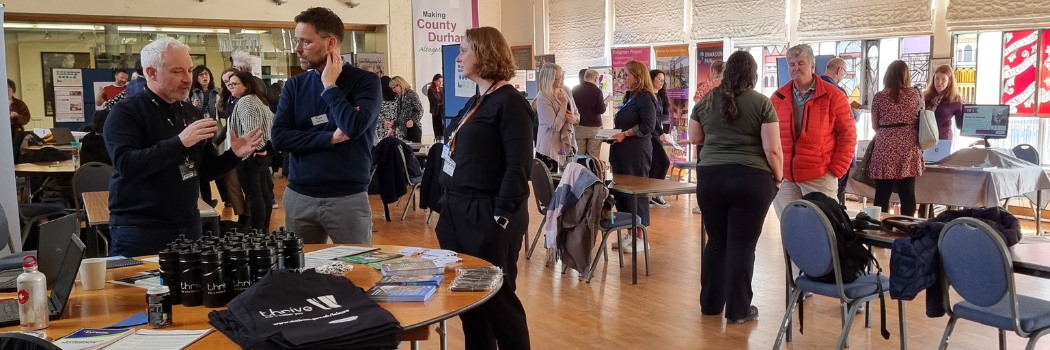Working together to improve health and social care in North East England

As a university rooted in North East England, we’re always looking for ways to work with local partners to help our region thrive.
This includes helping to improve health and social care for residents through the County Durham Care Partnership.
The partnership brings together health and social care services and voluntary organisations, to give County Durham residents better connected services.
Committed to improving health and wellbeing
.png) We contribute by sharing our health-related research and supporting the development of health and social care workers in the region.
We contribute by sharing our health-related research and supporting the development of health and social care workers in the region.
We work alongside leaders in the health and local authority sectors and generate some of the evidence that underpins the effectiveness of healthcare interventions.
Reflecting the significance of our work in this area, we recently appointed our first Associate Pro-Vice-Chancellor for Health, Professor Charlotte Clarke.
Professor Clarke is a member of the partnership’s Executive Committee and sits on the County Durham Health and Wellbeing Board.
Professor Clarke said: “It is critical that our work is informed by the needs of the region and that our research and education is relevant and significant to addressing inequalities in health and provision of quality services.”
Showcasing world-leading research
Durham research that has proved useful to the partnership includes work on infant sleep safety, pain management and dementia.
These and other projects were featured at a recent Research Marketplace event involving over 20 exhibitors showcasing the best in health and social care research and innovation.
Michael Laing, Director of Integrated Community Services at the County Durham Care Partnership, said: “The Research Marketplace introduced us to a range of disciplines and projects which will materially improve the health outcomes for County Durham’s residents.
“The variety and extent of Durham University’s research brings a different perspective to our work, introduces evidence-based best practice, helps us to be outward looking and improves our decision making.”
Insight and understanding
Jane Robinson, Corporate Director for Adult and Health Services at Durham County Council, added: “By collaborating with teams across the social care and public health sectors, Durham University researchers are supporting our ambitions to deliver the best possible care to people across the county.
“They are providing us with insights that help us to enhance the services we deliver, while also giving us a clearer understanding of the issues affecting our communities and health and social care workers.
“The Research Marketplace was a fantastic opportunity for us to learn more about the work Durham University is undertaking right now – on topics ranging from infant sleep to pain management.
“I have no doubt the findings of this research will be a valuable resource for the County Durham Care Partnership in the years ahead.”
Transforming lives through service improvements
The County Durham Care Partnership has already delivered multiple improvements for the region’s residents.
These include 32 per cent fewer care home residents referred to hospital A&E departments than the national average, a 26 per cent reduction in unnecessary hospital discharge referrals and 96 per cent of all medical equipment being delivered on time.
It has also ‘eliminated’ waiting lists for home care packages because of the way the partnership jointly commissions and supports care providers.
The partnership will continue to address challenges such as reducing health inequalities and recruiting and retaining healthcare staff.
Find out more
- Learn more about the County Durham Care Partnership
- Read about the appointment of our Associate Pro-Vice-Chancellor (Health), Professor Charlotte Clarke
- Durham institutes and centres showcased at the Research Marketplace event include the Wolfson Research Institute for Health and Wellbeing, Institute for Medical Humanities, Centre for Neurodiversity and Development, Centre for Social Justice and Community Action, Centre for Death and Life Studies, and the Policy Hub
We are incredibly lucky to have a university in County Durham that is nationally and internationally recognised for its pioneering research.


/prod01/prodbucket01/media/durham-university/campaign-sites/general-election-2024-hub/Election-Banner-1920X640.jpg)